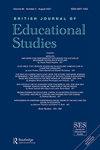ISLAMIC ETHICS AS ALTERNATIVE EPISTEMOLOGY IN INTERCULTURAL EDUCATION: EDUCATORS’ SITUATED KNOWLEDGES
IF 2.1
3区 教育学
Q2 EDUCATION & EDUCATIONAL RESEARCH
引用次数: 0
Abstract
ABSTRACTThis paper explores the epistemological affordances of Islamic ethics as alternative knowledge within intercultural education. Despite the calls for epistemological plurality in intercultural education that centre epistemologies of the South, educators may find it hard to reaffirm their situated knowledges and practices because they may have been overwhelmed by the wide endorsements of the mainstream literature. Drawing on in-depth interviews with 25 EFL teachers, this study aims to (a) unpack educators’ perspectives around the adoption of alternative knowledges anchored in local epistemologies and sensibilities, (b) foreground educators’ epistemic positioning around alternative knowledges and how they are perceived as sites for cognitive and pedagogical renewal to account for local particularities and conditions and (c) examine inter-epistemic tensions within educators’ reasoning in terms of how they navigate (in)congruencies between the mainstream and Islamic philosophy at the conceptual, pedagogical and practical levels. Findings reveal that educators acknowledge the legitimacy of Islamic ethics and their epistemological/pedagogical significance in intercultural education. However, some factors may problematize educators’ attempts at making use of Islamic ethics including the additional burden of reflecting alternative knowledges while attending to contextual factors (class size, the course’s orientation, exams, time constraints, etc.) and the lack of sufficient training in intercultural education.Keywords: Islamic ethicsintercultural educationalternative epistemologyeducators’ knowledgesmainstream literaturethinking otherwise 6. Disclosure StatementNo potential conflict of interest was reported by the author(s).伊斯兰伦理作为跨文化教育的另类认识论:教育者的情境知识
摘要本文探讨了伊斯兰伦理在跨文化教育中的认识论启示。尽管以南方认识论为中心的跨文化教育呼吁认识论多元化,但教育工作者可能会发现很难重申他们所处的知识和实践,因为他们可能已经被主流文献的广泛认可所淹没。通过对25名英语教师的深入访谈,本研究旨在(a)揭示教育工作者对采用以当地认识论和感性为基础的替代知识的看法;(b)展望教育者围绕替代知识的认知定位,以及他们如何被视为认知和教学更新的场所,以解释当地的特殊性和条件;(c)根据他们如何在概念、教学和实践层面上导航主流和伊斯兰哲学之间的一致性,检查教育者推理中的认知间紧张关系。研究结果表明,教育工作者承认伊斯兰伦理的合法性及其在跨文化教育中的认识论/教学意义。然而,有些因素可能会给教育者利用伊斯兰伦理的尝试带来问题,包括在考虑环境因素(班级规模、课程方向、考试、时间限制等)的同时反映其他知识的额外负担,以及在跨文化教育方面缺乏足够的培训。关键词:伊斯兰伦理跨文化教育另类认识论教育者的知识主流文学另类思维披露声明作者未报告潜在的利益冲突。
本文章由计算机程序翻译,如有差异,请以英文原文为准。
求助全文
约1分钟内获得全文
求助全文
来源期刊

British Journal of Educational Studies
EDUCATION & EDUCATIONAL RESEARCH-
CiteScore
4.50
自引率
5.30%
发文量
36
期刊介绍:
The British Journal of Educational Studies is one of the UK foremost international education journals. It publishes scholarly, research-based articles on education which draw particularly upon historical, philosophical and sociological analysis and sources.
 求助内容:
求助内容: 应助结果提醒方式:
应助结果提醒方式:


